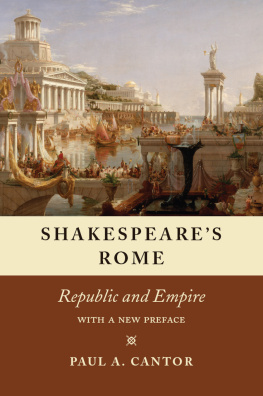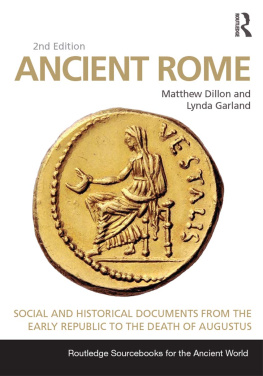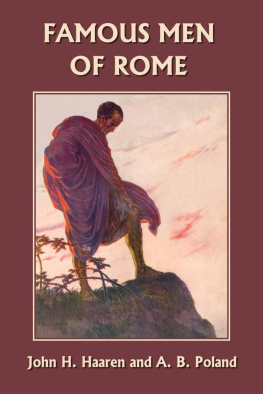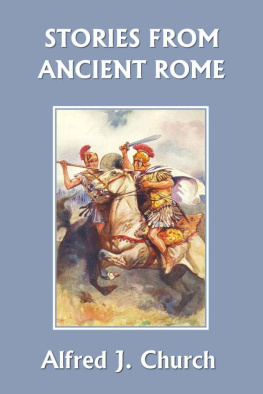CHAPTER I
The period of Roman history on which we now enter is, like so many that had preceded it, a period of revolt, directly aimed against the existing conditions of society and, through the means taken to satisfy the fresh wants and to alleviate the suddenly realised, if not suddenly created, miseries of the time, indirectly affecting the structure of the body politic. The difference between the social movement of the present and that of the past may be justly described as one of degree, in so far as there was not a single element of discontent visible in the revolution commencing with the Gracchi and ending with Caesar that had not been present in the earlier epochs of social and political agitation. The burden of military service, the curse of debt, the poverty of an agrarian proletariate, the hunger for land, the striving of the artisan and the merchant after better conditions of labour and of tradethe separate cries of discontent that find their unison in a protest against the monopoly of office and the narrow or selfish rule of a dominant class, and thus gain a significance as much political as socialall these plaints had filled the air at the time when Caius Licinius near the middle of the fourth century, and Appius Claudius at its close, evolved their projects of reform. The cycle of a nation's history can indeed never be broken as long as the character of the nation remains the same. And the average Roman of the middle of the second century before our era[1] was in all essential particulars the Roman of the times of Appius and of Licinius, or even of the epoch when the ten commissioners had published the Tables which were to stamp its perpetual character on Roman law. He was in his business relations either oppressor or oppressed, either hammer or anvil. In his private life he was an individualist whose sympathies were limited to the narrow circle of his dependants; he was a trader and a financier whose humanitarian instincts were subordinated to a code of purely commercial morality, and who valued equity chiefly because it presented the line of least resistance and facilitated the conduct of his industrial operations. Like all individualists, he was something of an anarchist, filled with the idea, which appeared on every page of the record of his ancestors and the history of his State, that self-help was the divinely given means of securing right, that true social order was the issue of conflicting claims pushed to their breaking point until a temporary compromise was agreed on by the weary combatants; but he was hampered in his democratic leanings by the knowledge that democracy is the fruit of individual self-restraint and subordination to the common willqualities of which he could not boast and symbols of a prize which he would not have cared to attain at the expense of his peculiar ideas of personal freedomand he was forced, in consequence of this abnegation, to submit to an executive government as strong, one might almost say as tyrannous, as any which a Republic has ever displayeda government which was a product of the restless spirit of self-assertion and self-aggrandisement which the Roman felt in himself, and therefore had sufficient reason to suspect in others.
The Roman was the same; but his environment had changed more startlingly during the last fifty or sixty years than in all the centuries that had preceded them in the history of the Republic. The conquest of Italy had, it Is true, given to his city much that was new and fruitful in the domains of religion, of art, of commerce and of law. Bat these accretions merely entailed the fuller realisation of a tendency which had been marked from the earliest stage of Republican historythe tendency to fit isolated elements in the marvellous discoveries made by the heaven-gifted race of the Greeks into a framework that was thoroughly national and Roman. Ideas had been borrowed, and these ideas certainly resulted in increased efficiency and therefore in increased wealth. But the gross material of Hellenism, whether as realised in intellectual ideas or (the prize that appealed more immediately to the practical Roman with his concrete mind) in tangible things, had not been seized as a whole as the reward of victory: and no great attempt had been made in former ages to assimilate the one or to enjoy the other. The nature of the material rewards which had been secured by the epochs of Italian conquest had indeed made such assimilation or enjoyment impossible. They would have been practicable only in a state which possessed a fairly complete urban life; and the effect of the wars which Rome waged with her neighbours in the peninsula had been to make the life of the average citizen more purely agricultural than it had been in the early Republic, perhaps even in the epoch of the Kings. The course of a nation's political, social and intellectual history is determined very largely by the methods which it adopts for its own expansion at the inevitable moment when its original limits are found to be too narrow to satisfy even the most modest needs of a growing population. The method chosen will depend chiefly on geographical circumstances and on the military characteristics of the people which are indissolubly connected with these. When the city of Old Greece began to feel the strength of its growing manhood, and the developing hunger which was both the sign and the source of that strength, it looked askance at the mountain line which cut it off from the inland regions, it turned hopeful eyes on the sea that sparkled along its coasts; it manned its ships and sent its restless youth to a new and distant home which was but a replica of the old. The results of this maritime adventure were the glories of urban life and the all-embracing sweep of Hellenism. The progress of Roman enterprise had been very different. Following the example of all conquering Italian peoples,[2] and especially of the Sabellian invaders whose movements immediately preceded their own, the Romans adopted the course of inland expansion, and such urban unity as they had possessed was dissipated over the vast tract of territory on which the legions were settled, or to which the noble sent his armed retainers, nominally to keep the land as the public domain of Rome, in reality to hold it for himself and his descendants. At a given moment (which is as clearly marked in Roman as in Hellenic history) the possibility of such expansion ceased, and the necessity for its cessation was as fully exhibited in the policy of the government as in the tastes of the people. No Latin colony had been planted later than the year 181, no Roman colony later than 157,[3] and the senate showed no inclination to renew schemes for the further assignment of territory amongst the people. There were many reasons for this indifference to colonial enterprise. In the first place, although colonisation had always been a relief to the proletariate and one of the means regularly adopted by those in power for assuaging its dangerous discontent, yet the government had always regarded the social aspect of this method of expansion as subservient to the strategic.[4] This strategic motive no longer existed, and a short-sighted policy, which looked to the present, not to the future, to men of the existing generation and not to their sons, may easily have held that a colony, which was not needed for the protection of the district in which it was settled, injuriously affected the fighting-strength of Rome. The maritime colonies which had been established from the end of the great Latin war down to the close of the second struggle with Carthage claimed, at least in many cases, exemption from military service,[5] and a tradition of this kind tends to linger when its justification is a thing of the past. But, even if such a view could be repudiated by the government, it was certain that the levy became a more serious business the greater the number of communities on which the recruiting commander had to call, and it was equally manifest that the veteran who had just been given an allotment on which to establish his household gods might be inclined to give a tardy response to the call to arms. The Latin colony seemed a still greater anachronism than the military colony of citizens. The member of such a community, although the state which he entered enjoyed large privileges of autonomy, ceased to be a Roman citizen in respect to political rights, and even at a time when self-government had been valued almost more than citizenship, the government had only been able to carry out its project of pushing these half-independent settlements into the heart of Italy by threatening with a pecuniary penalty the soldier who preferred his rights as a citizen to the benefits which he might receive as an emigrant.[6] Now that the great wars had brought their dubious but at least potential profits to every member of the Roman community, and the gulf between the full citizens and the members of the allied communities was ever widening, it was more than doubtful whether a member of the former class, however desperate his plight, would readily condescend to enroll himself amongst the latter. But, even apart from these considerations, it must have seemed very questionable to any one, who held the traditional view that colonisation should subserve the purposes of the State, whether the landless citizen of the time could be trusted to fulfil his duties as an emigrant. As early as the year 186 the consul Spurius Postumius, while making a judicial tour in Italy, had found to his surprise that colonies on both the Italian coasts, Sipontum on the Upper, and Buxentum on the Lower Sea, had been abandoned by their inhabitants: and a new levy had to be set on foot to replace the faithless emigrants who had vanished into space.[7] As time went on the risk of such desertion became greater, partly from the growing difficulty of maintaining an adequate living on the land, partly from the fact that the more energetic spirits, on whom alone the hopes of permanent settlement could depend, found a readier avenue to wealth and a more tempting sphere for the exercise of manly qualities in the attractions of a campaign that seemed to promise plunder and glory, especially when these prizes were accompanied by no exorbitant amount of suffering or toil. Thus when it had become known that Scipio Africanus would accompany his brother in the expedition against Antiochus, five thousand veterans, both citizens and allies, who had served their full time under the command of the former, offered their voluntary services to the departing consul,[8] and nineteen' years later the experience which had been gained of the wealth that might be reaped from a campaign in Macedonia and Asia drew many willing recruits to the legions which were to be engaged in the struggle with Perseus.[9] The semi-professional soldier was in fact springing up, the man of a spirit adventurous and restless such as did not promise contentment with the small interests and small rewards of life in an Italian outpost. But, if the days of formal colonisation were over, why might not the concurrent system be adopted of dividing conquered lands amongst poorer citizens without the establishment of a new political settlement or any strict limitation of the number of the recipients? This 'viritane' assignation had always run parallel to that which assumed the form of colonisation; it merely required the existence of land capable of distribution, and the allotments granted might be considered merely a means of affording relief to the poorer members of existing municipalities. The system was supposed to have existed from the times of the Kings; it was believed to have formed the basis of the first agrarian law, that of Spurius Cassius in 486;[10] it had been employed after the conquest of the Volscians in the fourth century and that of the Sabines in the third;[11] it had animated the agrarian legislation of Flaminius when in 232 he romanised the







